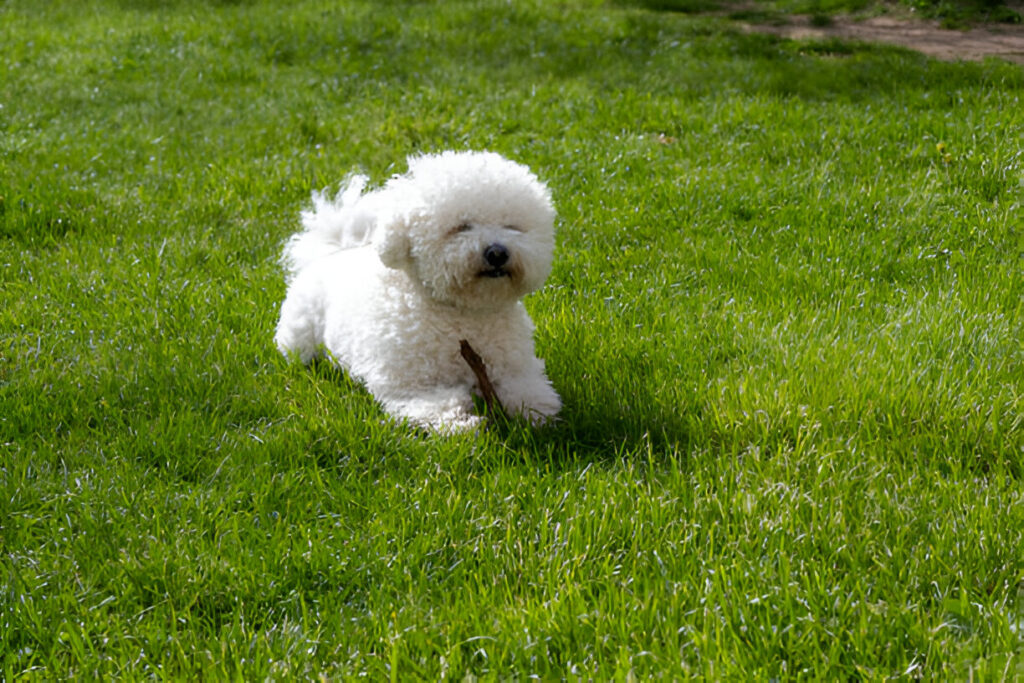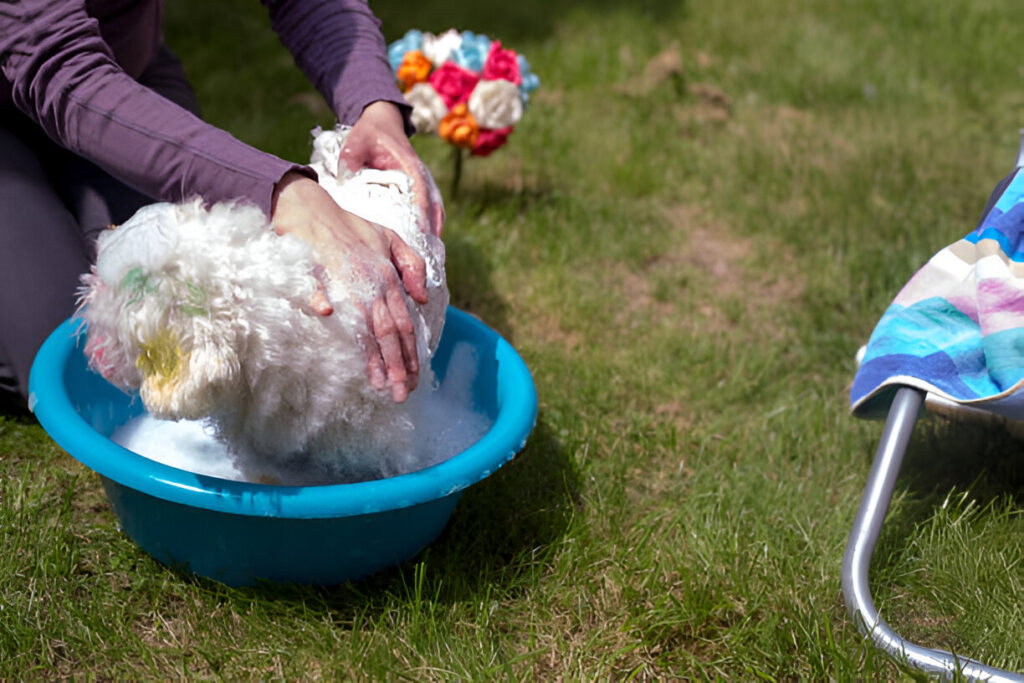what size is a 4 month old bichon puppy
If you’re a proud owner of a Bichon Frise puppy or considering bringing one into your home, you might be wondering about their growth and size at different stages of their life. At 4 months old, a Bichon Frise puppy is in a crucial stage of development, and understanding their size can help you ensure they’re growing healthily. In this blog, we’ll explore what to expect from a 4-month-old Bichon puppy, including their size, weight, and tips for caring for them during this stage.
How Big is a 4-Month-Old Bichon Frise Puppy?

At 4 months old, a Bichon Frise puppy is still in the early stages of development but is growing steadily. Here’s a more detailed breakdown of their size, growth, and what to expect during this stage:
Weight:
- A 4-month-old Bichon Frise typically weighs between 4 to 7 pounds (1.8 to 3.2 kg).
- Some are a bit lighter or heavier because of many factors which include genetics, diet, and activity.
- By this age, they are at their halfway mark for their adult weight since Bichon Frises reach their full adult weight of about 10 to 18 pounds or 4.5 to 8 kg by the time they reach their 12th to 15th month.
Height:
- A 4-month-old Bichon Frise is about 6 to 9 inches (15 to 23 cm) tall at the shoulder.
- Their legs are still developing, and they may appear leggy or awkward as they grow into their bodies.
- At adulthood, they usually have reached a height of 9 to 12 inches (23 to 30 cm) at the shoulder.
Length:
- From nose to tail, a 4-month-old Bichon Frise is about 10 to 12 inches (25 to 30 cm) long.
- Their bodies are compact and proportionate with a slightly rounded appearance due to their fluffy coat.
Coat and Appearance:
- At 4 months, the Bichon Frise’s signature fluffy, curled coat is just beginning to start coming in, although it may not be completely developed.
- The coat is soft, cotton-like, and requires frequent grooming to prevent matting and tangling.
- Their facial features are starting to become more defined; their eyes are darkening and rounder, and their nose blackens to give them the “teddy bear” look.
Growth Rate:
- Bichon Frise puppies grow rapidly for the first 6 months of their life.
By 4 months, they are a good size in comparison to their eventual adult size but will continue to fill out over the next several months of growth at a considerably slow rate. Growth will ultimately begin to taper after 6 months, at which time they will start filling out, gaining muscle, and filling out their adult coat.
Activity Level and Development:
- Puppies of Bichon Frise are very playful, energetic, and curious at 4 months.
- They learn to explore their surroundings, and with growth, they get better coordinated.
- It is a very crucial time for socialization and training, as they become very receptive to new experiences and learning basic commands.
Feeding and Nutrition:
- A 4-month-old Bichon Frise needs excellent quality puppy food to grow and develop properly.
- They can have 3 to 4 small meals per day because of their high energy level.
- Pay attention to portion control in order not to let them overeat because they can surely develop obesity if their diet is not properly regulated.
Teething:
- Your Bichon Frise puppy is probably in the middle of teething at 4 months.
- You may find them chewing on toys, furniture, or other objects to relieve discomfort as their adult teeth come in.
- Providing appropriate chew toys and teething aids can help protect your belongings and keep your puppy comfortable.
Health Considerations:
- Regular veterinary check-ups are very important to make sure your puppy is growing properly and also to monitor for any potential health issues.
- Vaccinations and deworming should be up to date; your vet may recommend starting preventive care for common issues such as dental health and joint health.
What Factors Influence a Bichon Puppy’s Size?

Several factors help in determining the size of a 4-month-old Bichon Frise puppy in different ways as this is the most critical stage for growth and development of the puppy. These can, however, be known to you to enable your puppy to realize full potential in a healthy and balanced manner. Following is a detailed look at what may affect their size:
1. Genetics:
Parental Size: Bichon puppies get their weight from their parents. If the parents are much closer to the small side of the breed standard-10 to 12 pounds (4.5-5.5 kgs)-it may be expected to be smaller in size. Should the parents are larger, approximately 15 to 18 pounds (7 to 8 kgs), so shall the puppy probably grow on to be larger in size.
- Breed Line: Some lines of Bichon Frise are bred to be a little smaller or a little larger than the standard. Reputable breeders can often give an accurate estimation of how big a puppy will grow based on its lineage.
- Mixed Heritage: If the puppy isn’t purebred Bichon Frise, the size and other characteristics of another breed or breeds involved in his lineage also have bearing on how the puppy grows and the ultimate size he can achieve.
2. Diet and Nutrition:

Photo de Aisha
- Quality of Food: A nutritional, high-quality puppy food given, suitable for small breeds, is really needed in healthy growth. Puppies need a diet full of proteins, fats, vitamins, and minerals for quick development.
- Portion Control: Overfeeding can result in excessive weight gain, straining a puppy’s bones and joints while still in development. Conversely, underfeeding will cause stunted growth and malnutrition. Following feeding guidelines and consulting with your vet can help ensure your puppy gets the right amount of food.
- Feeding Schedule: Small puppies take small, frequent meals throughout the day to sustain energy and promote the growth of these animals at constant rates, typically 3-4 meals a day.
3. Health and Medical Factors
- Wholeness of Health: Healthy puppies, free from any disease or parasite infestation, usually grow at a constant rate. Infections, digestive problems, or congenital conditions may hinder proper growth and development.
- Vaccinations and Preventative Care: Keeping up with vaccinations, deworming, and regular vet check-ups ensures your puppy stays healthy and grows properly.
- Dental Health: Teething can sometimes affect a puppy’s appetite, which may temporarily impact their growth. Providing appropriate chew toys and monitoring their eating habits can help.
4. Exercise and Activity Level:
- Moderate Exercise: It is very necessary to provide them with regular, moderate exercises. Playing, short walks, and several other interactive games are different ways to enhance coordination and strength without overexertion of the puppy.
- Avoid Overexertion: While he needs this exercise, too much physical activity might put a strain on the bones and joints because they are still growing. Avoid things like jumping, or running long distances for that matter, until they get old enough.
- Mental Stimulation: Mental stimulation through training and puzzle toys also ensures that your puppy will grow into a well-rounded adult.
5. Environment and Care:

- Stress Levels: A calm, nurturing environment is required for healthy growth. Puppies experiencing high levels of stress or anxiety may have disrupted eating or sleeping patterns, affecting their development.
- Sleep and Rest: Puppies need plenty of sleep to help their growth. A 4-month-old Bichon Frise can sleep for 18-20 hours a day because this is when their bodies are growing the most.
- Grooming and Hygiene: Grooming not only maintains your puppy’s coat but it is also important in checking the overall condition of the puppy, skin conditions, and weight gain or loss.
6. Gender:
- Male vs. Female: In some cases, male Bichon Frise puppies may grow slightly larger than females, though this is not always a significant difference. Gender can play a minor role in determining final size, though it usually takes a back seat to genetics and other factors.
7. Early Life Experiences:
- Weaning and Early Nutrition: The phase of transition from mother’s milk to solid food is very critical. Puppies which are weaned off too early, or ill-nourished in this period, usually show retarded growth.
- Socialization and Stress: Well-socialized puppies, exposed to positive experiences in their early life, tend to remain healthier and grow more uniformly, while puppies kept in isolation or stressed will be more prone to diseases and may have irregular growth.
8. Breed-Specific Growth Patterns:
- Small Breed Growth Rate: The pattern of growth for a Bichon Frise is typical of that seen in small breeds: rapid growth within the first 6 months followed by gradual deceleration. At 4 months, he will be about halfway there in size; after that, growth tapers off and reaches complete maturity at approximately 12-15 months.
- Growth Spurts: Growth spurts are bound to happen, in which puppies grow quite rapidly within a short period, and then this growth slows down. This is normal in development.
Caring for Your 4-Month-Old Bichon Frise Puppy

Caring for a 4-month-old Bichon Frise puppy is an exciting and rewarding experience. At this stage, your puppy is full of energy, curiosity, and a desire to explore the world around them. Proper care during this critical developmental period will set the foundation for a healthy, happy, and well-behaved adult dog. Here’s how to caring for your 4-month-old Bichon Frise:
| Aspect | Details |
|---|---|
| Balanced Diet | – Feed high-quality, small-breed-specific puppy food. – Provide 3-4 small meals daily. – Avoid table scraps; use puppy-specific treats sparingly. – Ensure access to fresh water at all times. |
| Regular Vet Checkups | – Keep vaccinations up-to-date. – Schedule deworming and parasite prevention. – Monitor growth and health with regular checkups. – Discuss spaying/neutering with your vet. |
| Socialization | – Introduce to new people, animals, sounds, and environments. – Use positive reinforcement for new experiences. – Consider puppy socialization classes. |
| Training | – Teach basic commands (sit, stay, come, leave it). – Establish a consistent housebreaking routine. – Use crate training for safety and comfort. – Be patient and consistent with positive reinforcement. |
| Grooming | – Brush coat 2-3 times a week to prevent matting. – Bathe every 3-4 weeks with dog-specific shampoo. – Clean ears weekly. – Trim nails regularly. – Schedule professional grooming every 4-6 weeks. |
| Exercise and Play | – Provide 20-30 minutes of moderate exercise daily. – Engage in interactive games and mental stimulation. – Avoid overexertion to protect developing joints. |
| Safety and Comfort | – Puppy-proof your home to remove hazards. – Provide a cozy bed or crate. – Supervise during playtime and exploration. |
| Love and Attention | – Spend quality time bonding with your puppy. – Use praise, treats, and affection to reinforce good behavior. – Be patient and consistent in training and care. |
What to Expect as Your Bichon Grows
By 4 months old, your Bichon Frise puppy is likely to have a lot of energy and a playful personality. They’ll continue to grow until they reach their adult size, which is typically around 9 to 12 months old. Adult Bichons usually weigh between 10 to 18 pounds (4.5 to 8 kg) and stand about 9 to 12 inches (23 to 30 cm) tall.
Final Thoughts
A 4-month-old Bichon Frise puppy is a bundle of joy, full of energy and curiosity. At this stage, they’re still small but growing quickly, and proper care is essential to ensure they develop into a healthy adult. By providing a balanced diet, regular vet care, and plenty of love and attention, you’ll set your Bichon puppy up for a happy and healthy life.
If you have any concerns about your puppy’s growth or development, don’t hesitate to consult your veterinarian. Enjoy this adorable stage—it goes by fast!
Do you have a 4-month-old Bichon Frise puppy? Share your experiences and tips in the comments below! 🐾
Yuns Legdm is a passionate advocate for pet care and the founder of this website, dedicated to providing valuable information for fellow pet lovers and veterinary professionals worldwide. With a deep love for animals, Yuns created this platform to connect passionate pet owners with expert insights from veterinarians around the globe.
This website grows with you—the passionate pet owners and veterinary experts—creating a trusted space where knowledge, experience, and love for animals come together. Whether you’re seeking advice on pet health, nutrition, or general well-being, this platform is here to support you on your journey of responsible and loving pet care.





